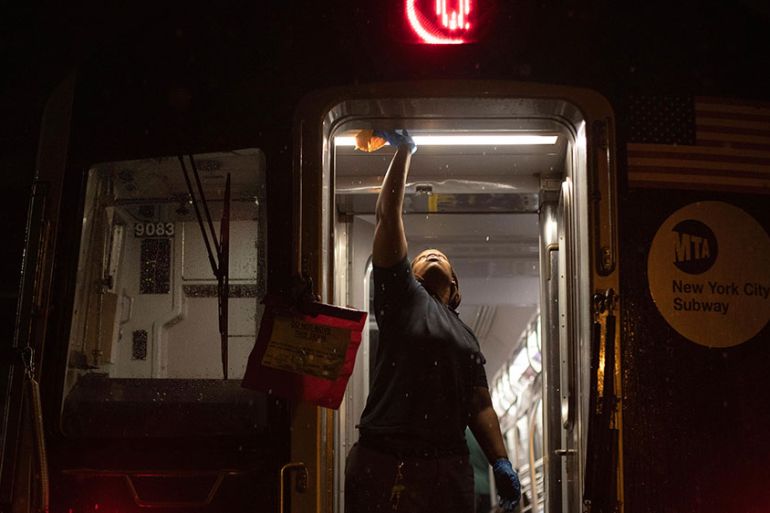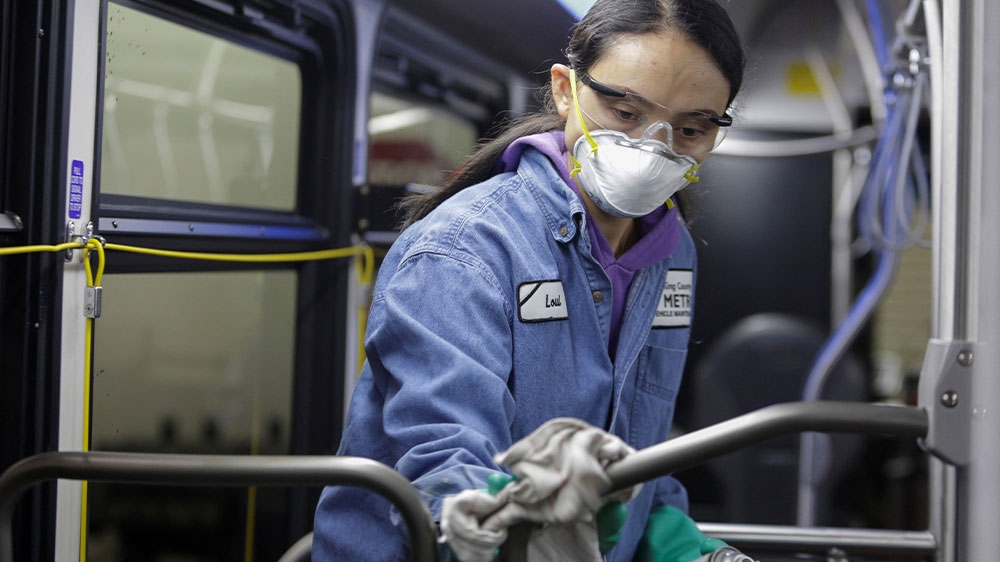US House approves $8.3bn in spending to fight coronavirus
As the United States prepares for a wider coronavirus outbreak, Congress plans to pass emergency funding legislation.

The United States House of Representatives on Wednesday voted nearly unanimously, 415-2, to approve an $8.3bn emergency spending bill to address the threat of the COVID-19 coronavirus in the US and globally.
Amid signs the virus is spreading from person to person in the US, the bill will be taken up quickly in the US Senate and sent to President Donald Trump for his signature by the end of the week, lawmakers said.
Keep reading
list of 4 itemsMexico’s teachers seek relief from pandemic-era spike in school robberies
‘A bad chapter’: Tracing the origins of Ecuador’s rise in gang violence
Why is the US economy so resilient?
“The American people are counting on our government for a fully funded, coordinated and comprehensive government-wide response to the coronavirus,” said Representative Nita Lowey, the Democratic chairman of the House Committee on Appropriations.
“We must quickly enact this legislation – lives are at stake,” Lowey said.
“We have an emergency,” said Representative Fred Upton, a Republican. “I urge all of my colleagues to support this money and get it to the president as quickly as possible.”
Members of the House had a closed-door briefing from Vice President Mike Pence on Wednesday.
Pence told legislators that Trump would soon be asking US businesses to allow employees to work remotely or take paid leave.
For now, there are no new domestic travel restrictions within the US, and new test kits for the virus are being distributed to individual states. The cost of testing will be covered by government healthcare programmes Medicaid and Medicare as well as private insurance, Pence told lawmakers.
|
|
According to a summary provided by the House Committee on Appropriations, the bill will provide:
- $2.2bn for public health funding for response and prevention, of which $950m is for state and local health agencies
- $1bn for pharmaceutical and medical supplies for hospitals and community medical centres
- $3bn for the development of vaccines, therapeutics and diagnostics
- $435m for health systems overseas
- $300m for humanitarian needs
- a potential $7bn in low-interest loans for small businesses
“We listened carefully to the agencies and experts on the front lines in crafting this package,” Senator Richard Shelby, the Republican chairman of the Senate Committee on Appropriations, said in a statement.
“I appreciate President Trump’s eagerness to sign this legislation,” Shelby said.
The spending bill dwarfs Trump’s initial request last week for $2.5bn in funds, which the administration sought in the early days of the epidemic to curb its potential effects.
The number of confirmed infections in the US climbed above 129 on Wednesday as doctors and hospitals began to test patients for the virus in at least 15 states. Ten people in Washington State and one person in California have died from the illness.
The medical response to the virus in the US had been delayed because of a lack of test kits. Those issues are now being resolved as more kits are distributed and the US Centers for Disease Control and Prevention (CDC) loosens restrictions on testing. There are now enough kits available to test 750,000 people, the CDC said on Wednesday.
Dr Anthony Fauci, the top contagious disease specialist at the US National Institutes of Health, told members of Congress in a public hearing on Wednesday that proactive testing in six US cities is being expanded and “will give us a good idea of what’s under the radar that we are missing”.
The CDC has begun testing people who show up in hospital emergency rooms with symptoms of COVID-19 in Los Angeles, San Francisco, Honolulu, New York, Chicago and Washington, DC. The CDC plans to expand the testing to other big cities as more resources become available, Fauci said.
While most people who contract the virus survive, new data from China suggests the mortality rate is above three percent, making the novel virus “many, many, many more times” deadly than the seasonal flu, Fauci told lawmakers on Wednesday.
So far, most of the confirmed cases of coronavirus have occurred in the Seattle area, where the virus spread through a nursing home for elderly people. But concern is rising nationally.

Seattle public health officials are preparing for a wider outbreak by buying a motel that can be outfitted as a makeshift hospital to house patients and planning new, modular housing units for those infected.
The state Democratic Party cancelled a pre-primary fundraising and awards dinner scheduled for Saturday night. Washington’s presidential primary election is scheduled for March 10.
“We are worried about events,” Representative Pamila Jayapal, a Democrat, told Al Jazeera.
“I was scheduled to do a lot of events this weekend,” Jayapal said. “We are looking to see and take guidance from the health department about what we should do. People are learning, trying not to be in big rooms with lots of people.”
As legislators travel back and forth from their home districts on weekends, the US Congress is weighing the possibility of suspending sessions as the virus spreads, Representative Rueben Gallego told reporters.
“We need to make sure that treatment and testing is as near free as possible,” said Gallego, who is planning to introduce a bill requiring the government to cover testing costs for everyone.
“This is a national health emergency,” Gallego said.